Filed under: Indigenous, Mexico, Revuelta Comunitaria
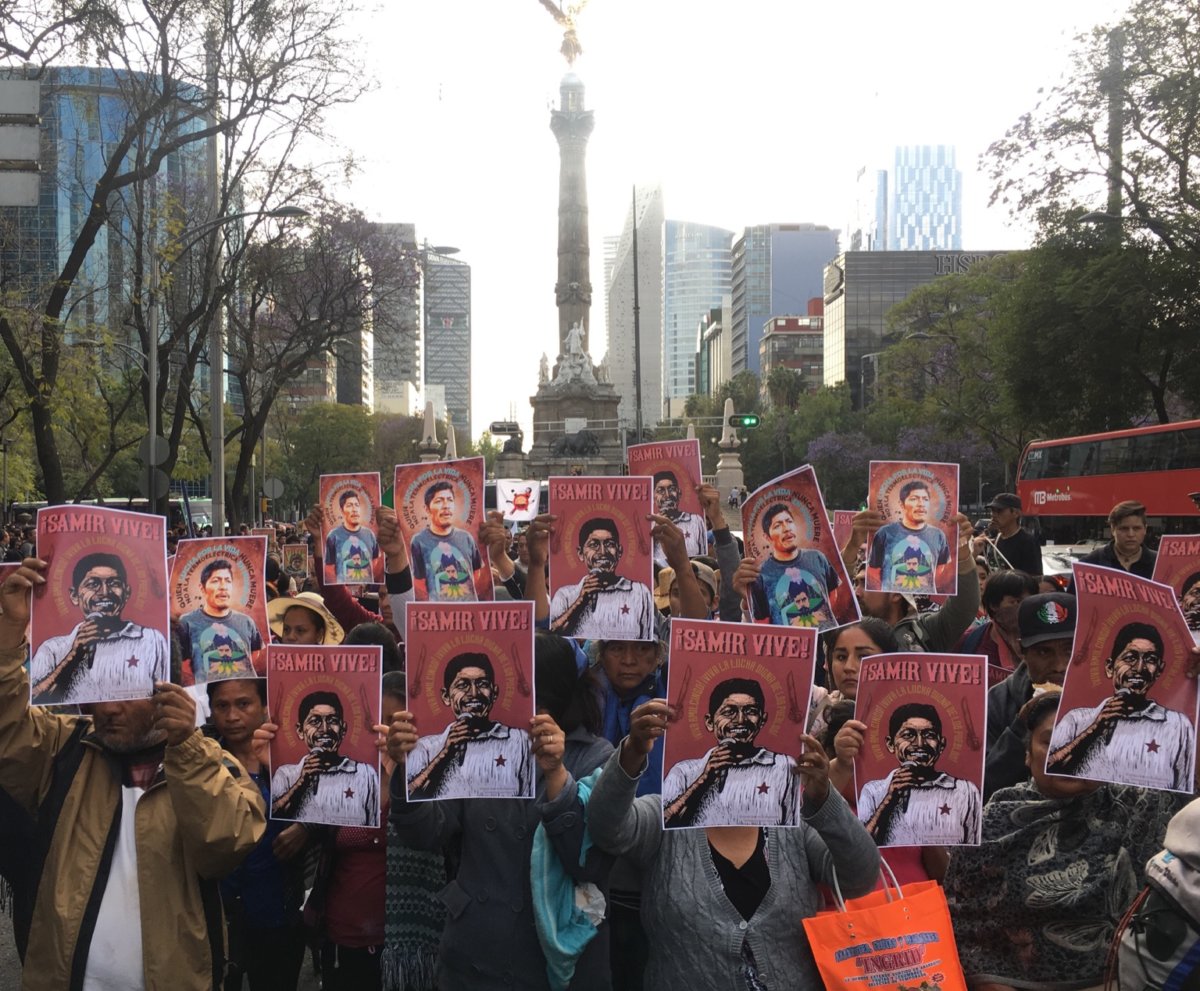
This piece is the latest in our semi-regular column “Revuelta Comunitaria” by the folks at Voices in Movement. It argues that the recent “popular consultations” being carried out by the new government administration in Mexico are a means to undermine the self-determination and autonomy of the pueblos in the name of democracy, and ultimately legitimize projects of dispossession and territorial plunder.
In the early morning hours of February 20th, 2019, two vehicles parked outside the house of Samir Flores Soberanes, an Indigenous community organizer, radio worker and land defender from the community of Amilcingo, Morelos. Upon hearing a knock at his door, Samir stepped outside. There the disguise of the new government administration, the entire MORENA political party apparatus, AMLO himself, was torn off. There, the politics of capital accumulation expressed themselves in their purest form: cowardly violence. In front of his home, two of the men who had arrived in the vehicles shot at Samir four times, with two bullets striking him in the head. He was quickly transferred to the nearby hospital where he was declared dead.
Samir was a long-time organizer for community autonomy and territorial defense in the region of Amilcingo, Morelos, and was one of the founding members of the community radio Amiltzinko 100.7. He was also a member of the People´s Front in Defense of Land and Water, Morelos, Puebla, Tlaxcala, and one of the principal organizers against the PIM (Proyecto Integral Morelos); a mega energy project which includes a thermoelectric plant in Huexca, Morelos, a gas pipeline that crosses more than 60 campesino communities in the states of Morelos, Puebla and Tlaxcala, as well as an aqueduct to move 50 million liters of water daily from the Cuautla River to the thermoelectric plant. The assassination of Samir came just three days before a “popular consultation” to decide the future of the Huexca thermoelectric plant. The “popular consultation” was president Andrés Manuel López Obrador’s attempt to legitimize a project that has faced stiff resistance from Indigenous and campesino communities in the region for nearly nine years.
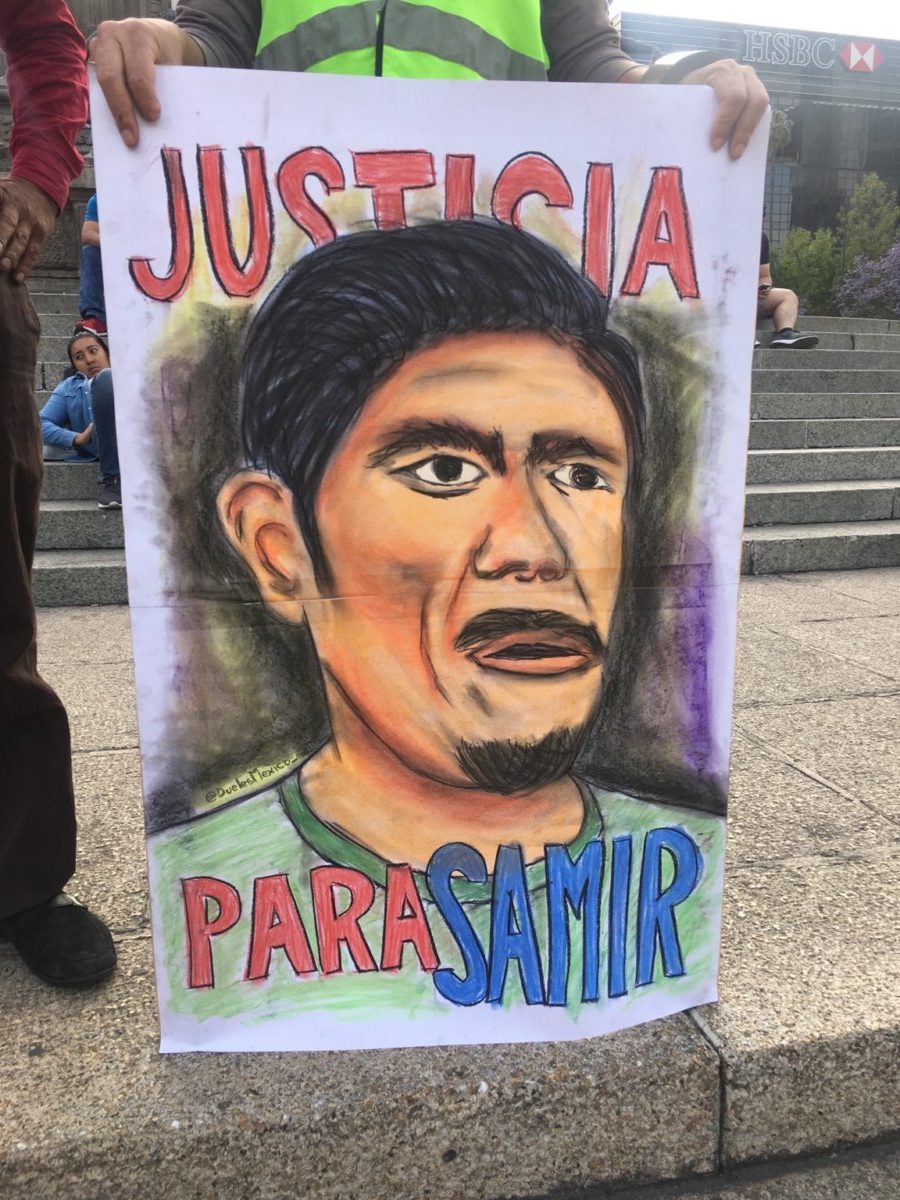 A master of deceptive populist rhetoric, AMLO has worked both sides of the PIM debate, previously expressing the absurdity of the PIM and the Huexca thermoelectric plant, while now seeking to move it forward under his democratic theater of “popular consultations.” In May of 2014, AMLO announced with fiery determination to defend the communities against the thermoelectric plant. “Only a madman would think of building a thermoelectric plant in the land of Zapata”, he said. Continuing his symbolic yet empty nod to the history of Indigenous and campesino resistance in the state of Morelos, on January 12th, 2019 in Ciudad Ayala, Morelos, López Obrador signed a degree naming 2019 as the official year of the Caudillo del Sur, Emiliano Zapata. Just a month later, he returned to spit on Zapata’s grave.
A master of deceptive populist rhetoric, AMLO has worked both sides of the PIM debate, previously expressing the absurdity of the PIM and the Huexca thermoelectric plant, while now seeking to move it forward under his democratic theater of “popular consultations.” In May of 2014, AMLO announced with fiery determination to defend the communities against the thermoelectric plant. “Only a madman would think of building a thermoelectric plant in the land of Zapata”, he said. Continuing his symbolic yet empty nod to the history of Indigenous and campesino resistance in the state of Morelos, on January 12th, 2019 in Ciudad Ayala, Morelos, López Obrador signed a degree naming 2019 as the official year of the Caudillo del Sur, Emiliano Zapata. Just a month later, he returned to spit on Zapata’s grave.
On February 10th, 2019, in Cuautla, Morelos, AMLO announced a “popular consultation” to decide the future of the Huexca thermoelectric plant. The consultation was set to take place on February 23rd and 24th in which 60 municipalities were to participate: 9 from the state of Tlaxcala, 36 from the state of Morelos and 15 from the state of Puebla. During the announcement, AMLO assured that with the “popular consultation” it would be the people who decide the future of the project, not him. Setting the stage for the consultation, and in a warning shot to those who have historically resisted the Huexca thermoelectric plant, AMLO spoke: “Listen radicals of the left, that for me are nothing more than conservatives, listen: if the thermoelectric plant of the Federal Electricity Commission isn’t used, instead of having the light to illuminate all of Morelos, we will have to continue buying electricity from foreign companies. That’s for sure. So, when it comes to voting, just think about that.”[i]
“Popular Consultations” and the Legitimization of Dispossession
The turn to “popular consultations,” embedded in a populist discourse of the people and not the powerful deciding the future of the country, has become a staple of AMLO’s politics, and a principle strategy of legitimizing illegitimate projects of capital accumulation. The first “popular consultation” took place before AMLO took power, on October 25th-28th, with a vote to decide the future of the new international airport of Mexico City. Cancellation of the already underway airport construction in the historic Lake of Texcoco was one of the staple promises of AMLO’s campaign, appealing to the historical resistance and seeking to distance himself from the brutal repression that previous administrations had carried out to implement the project. As a means to wash his hands clean with the waters of democracy, AMLO ordered the “popular citizen consultation” so as to allow the citizenry to decide the future of the country. The two options were set: continue the construction of the new terminal area of the ancient Lake of Texcoco in the state of Mexico, or recondition the current airport and also the international airport of Toluca in the state of Mexico. An integral part of the second option was the construction of two new runways at the Santa Lucía military base to accommodate more airplane traffic into Mexico City.
 The vote against the new airport of Mexico City won in the “popular consultation” leaving many to celebrate the historic victory, lead by years of campesino resistance in the historic Lake of Texcoco. However, the framework of debate allowed in the consultation, as well as the very logic of capital accumulation and development, has insured that the cancellation of the airport is set to lead only to a series of other megaprojects in Mexico City and the state of Mexico. With the reconditioning of the international airport in Toluca being part of the alternative to the airport in Texcoco, two megaprojects connecting the urban centers of Toluca and Mexico City will likely emerge back into the spotlight.
The vote against the new airport of Mexico City won in the “popular consultation” leaving many to celebrate the historic victory, lead by years of campesino resistance in the historic Lake of Texcoco. However, the framework of debate allowed in the consultation, as well as the very logic of capital accumulation and development, has insured that the cancellation of the airport is set to lead only to a series of other megaprojects in Mexico City and the state of Mexico. With the reconditioning of the international airport in Toluca being part of the alternative to the airport in Texcoco, two megaprojects connecting the urban centers of Toluca and Mexico City will likely emerge back into the spotlight.
The highway Toluca-Naucalpan, a project that has faced stiff resistance for over ten years from the Indigenous Otomí communities of San Francisco Xochicuautla, San Lorenzo Huitzizilapan and Santa Cruz Ayotuxco will likely play an integral part of the alternative development. The interurban train Toluca-Valley of Mexico, a nearly 60 kilometer train meant to connect the two urban centers, will also likely play a part in the series of infrastructure projects to accommodate the changes to the International airport in Toluca. In addition, the two new runways to be constructed at the Santa Lucía military base have already faced criticism from the surrounding neighborhoods. Thus, while the international airport of Mexico City was cancelled, the logic of endless capitalist growth will continue with various megaprojects meant to accommodate more airplane traffic to the international airport of Toluca, as well as to the Santa Lucía military base. Meanwhile, AMLO has framed himself as a torchbearer of democracy, and a friend of the resistance—something unfortunately many people still believe.
On November 24th and 25th a second “popular consultation” was held to decide the future of a series of projects and social programs that were being debated by the newly elected government administration. This “popular consultation” included two very important megaprojects. First, the Train Maya, a passenger train extending 1525 kilometers (950 miles), passing five states throughout the Mexican south east. The project includes a proposed 17 stations, connecting various tourist areas including the infamous Indigenous ruins of Palenque and the tourist resort of Cancun on the Caribbean coast. A second mega-project that made up this second consultation was the “Corredor Transístmico,” an industrial corridor connecting the ports of Salina Cruz, Oaxaca, on the pacific coast, and Coatzacoalcos, Veracruz, in the Caribbean. The project is meant to compete with the Panama Canal, as a route of land transportation connecting the Pacific and Atlantic oceans. Integral to the project is the modernization and or reconstruction of the ports in Coatzacoalcos and Salina Cruz along with a train, which is to connect the two ports.
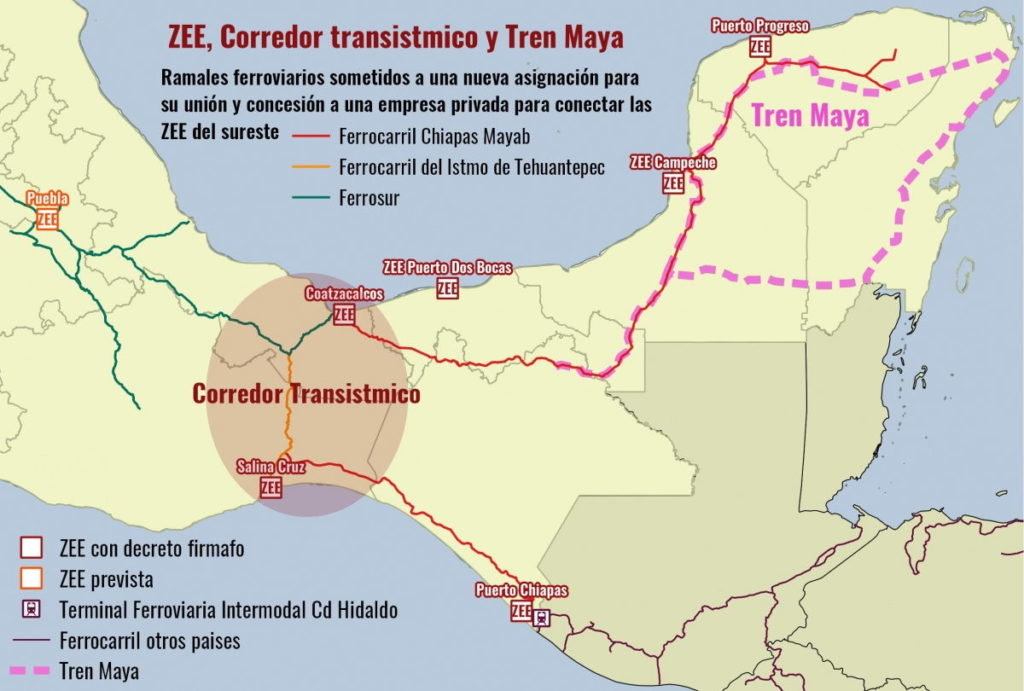 While Indigenous communities in the Istmo of Tehuantepec as well as throughout many parts of the Mexican Yucatan expressed their rejection of these megaprojects, with a participation of less than one percent of the population, these two projects were approved by “popular consultation.” Afterwards, on December 16th, with the presence of representatives of twelve Mayan groups from the region, AMLO participated in a folkloric ceremony, a cringe-worthy cultural stunt, asking Mother Earth for her consent in the construction of the new Train Maya. This was an insulting act to the communities in the region who have long organized in defense of their territory and their traditional political and cultural practices. It was particularly insulting as the very nature of the Train Maya project, is directly opposed to the communal and territorial forms of organization of Indigenous communities in the region. This farcical ceremony has followed a series of offensive acts of cultural appropriation engaged by AMLO, seeking to portray his commitment to Indigenous communities and legitimize his projects of dispossession.
While Indigenous communities in the Istmo of Tehuantepec as well as throughout many parts of the Mexican Yucatan expressed their rejection of these megaprojects, with a participation of less than one percent of the population, these two projects were approved by “popular consultation.” Afterwards, on December 16th, with the presence of representatives of twelve Mayan groups from the region, AMLO participated in a folkloric ceremony, a cringe-worthy cultural stunt, asking Mother Earth for her consent in the construction of the new Train Maya. This was an insulting act to the communities in the region who have long organized in defense of their territory and their traditional political and cultural practices. It was particularly insulting as the very nature of the Train Maya project, is directly opposed to the communal and territorial forms of organization of Indigenous communities in the region. This farcical ceremony has followed a series of offensive acts of cultural appropriation engaged by AMLO, seeking to portray his commitment to Indigenous communities and legitimize his projects of dispossession.
The third “popular consultation” staged by the AMLO administration, took place amidst stiff resistance and much discontent, following the state-sanctioned killing of Samir Flores, a cowardly act clearly meant to plant fear in those who have the courage and dignity to defend their territories. The vote was simple: “Do you agree with the initiation of operations of the PIM and the thermoelectric plant of Huexca belonging to the CFE? Yes or no.” With both rage and dignity, the people weren’t having it.
In the communities of Temoac and Amayuca, community members burned voting booths, expressing their committed resistance to the Huexca thermoelectric plant, along with the farcical consultation seeking to legitimize it. In the communities of Huexca and Hueyapan, the people met in assemblies following their traditional forms of decision-making where the community assembly is the maximum organ of decision-making power. Both communities rejected the installation of voting booths in their territories, declaring their rejection of the megaproject through community and collective decision-making. Members of the People’s Front in Defense of the Land and Water traveled through various municipalities in the region to sabotage the voting booths for the consultation, complementing their resistance with the chant: “Samir lives, the struggle continues.” Other communities who are to be directly affected by the project refused to allow the installation of the voting booths for the “popular consultation” declaring from the outset the consultation to be a sham, and committing themselves to resist the project regardless of the outcome of the vote.
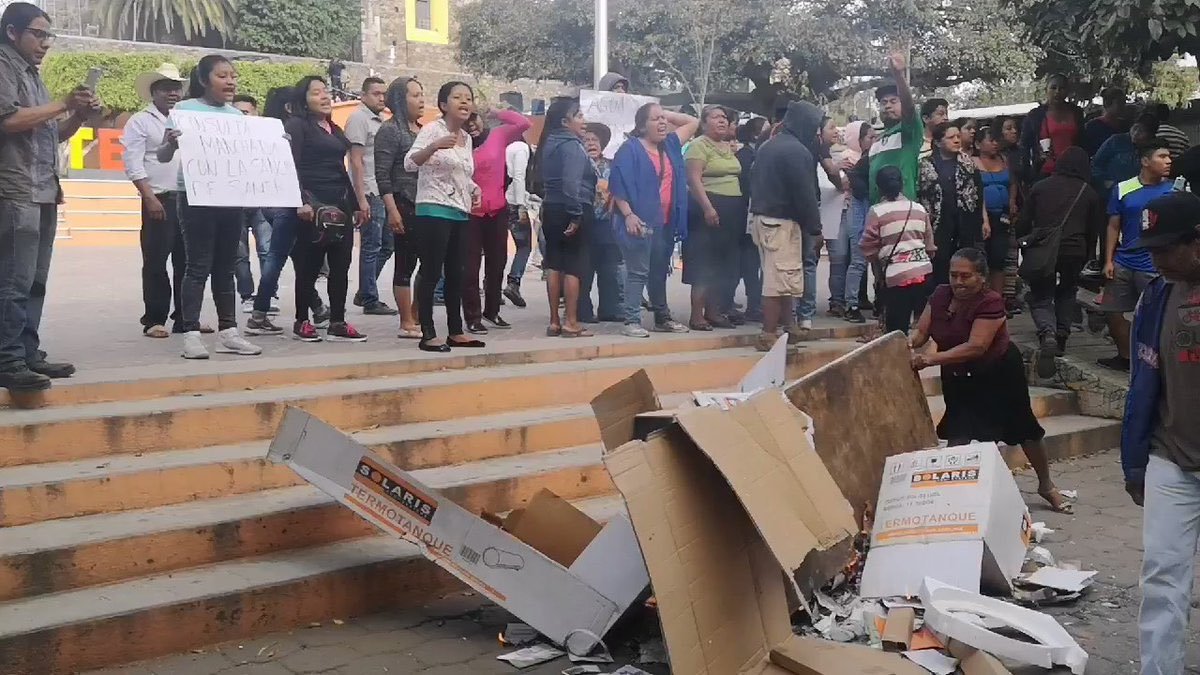 One day after the “popular consultation,” AMLO announced the results: 59.5 percent in favor, approving the initiation of the operation of the thermoelectric plant. In the “popular consultation,” a supposed 55,715 people participated with their vote—a small fraction of the different populations across the three states that were meant to participate in the decision. The grand majority of participants were people who live in communities that are not to be directly affected by the PIM megaproject, while those who are to be affected, generally refused to participate in the farcical consultation.
One day after the “popular consultation,” AMLO announced the results: 59.5 percent in favor, approving the initiation of the operation of the thermoelectric plant. In the “popular consultation,” a supposed 55,715 people participated with their vote—a small fraction of the different populations across the three states that were meant to participate in the decision. The grand majority of participants were people who live in communities that are not to be directly affected by the PIM megaproject, while those who are to be affected, generally refused to participate in the farcical consultation.
Democracy v. Autonomy and Self-Determination
In typical fashion, AMLO declared the vote to be a democratic success as the people themselves making the decision that will affect the future of the country. In an insult to Indigenous communities in Mexico who actually engage in power as a service to their communities, AMLO went to far as to declare the “poplar consultation” an act of mandar-obediciendo, or leading by obeying the people. Once again, AMLO was legitimizing projects of capital accumulation with the disguise of democracy.
The response from the people to the most recent “popular consultation” of the AMLO administration has been mixed. Many Indigenous communities and peoples opposed to the thermoelectric plant have rejected the legality of the “popular consultations.” Grounding their argument in convention 169 of the International Labor Organization addressing Indigenous and Tribal Peoples, communities have demanded the right to a free, prior and informed consultation regarding projects proposed in Indigenous territories—rights guaranteed in this convention. Mexican governments past and present have constantly violated this convention to see through megaprojects in the service of capital accumulation. Other critics of the consultation have pointed to the constitutional illegality of these “popular consultations,” and the lack of participation by the communities that are to be directly affected.
While these critiques are extremely important, pointing out the illegality and downright absurdity of these “popular consultations,” they fail to acknowledge a deeper critique necessary of AMLO’s discourse of popular consultations and of so-called democracy itself. The anarchist collective Crimethinc pinpointed this common response in a tongue in cheek tone in their series of essays critiquing democracy: “And what’s the cure for the problems with democracy? Everyone agrees: more democracy,”[ii] For many, the response to AMLO’s “popular consultations” has been a demand for more democracy, and not a deeper critique of perhaps democracy itself. We agree with the argument put forth by Crimthinc in the same collection: “Democracy is not the same as self-determination.”[iii]
A fundamental tension inherent to the popular consultations carried out by AMLO is the stark difference between the forms of organization of liberal democracy, grounded in individual rights, and the forms of organization of Indigenous and campesino communities, grounded in community organization and collective identity. The responses of the communities of Huexca and Hueyapan put this tension on display, when rather than allowing voting booths to be installed in their communities, they met in community assemblies, to both reject the very idea of voting in a consultation as such, but also making clear their committed resistance to the PIM project as whole.
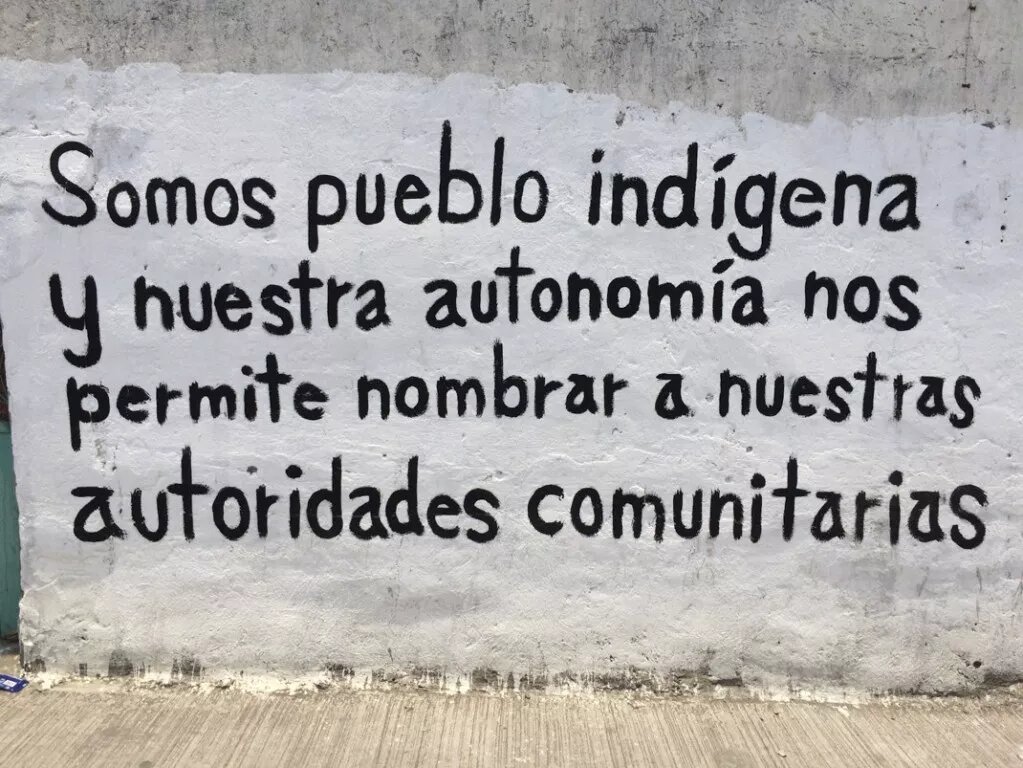 The tension between “popular consultations” of the liberal democratic type, and Indigenous community organization and decision-making is part of a much larger tension between the practices of Indigenous communities and the Mexican colonial state. While AMLO seeks to legitimize dispossession and destruction, by the casting of individual votes on yes or no questions, Indigenous communities continue to defend their territories through their everyday political, cultural and social practices. These practices cannot be framed within a “popular consultation.”
The tension between “popular consultations” of the liberal democratic type, and Indigenous community organization and decision-making is part of a much larger tension between the practices of Indigenous communities and the Mexican colonial state. While AMLO seeks to legitimize dispossession and destruction, by the casting of individual votes on yes or no questions, Indigenous communities continue to defend their territories through their everyday political, cultural and social practices. These practices cannot be framed within a “popular consultation.”
With all this in mind, we find it fundamental to reject these “popular consultations,” democratic or otherwise, as a farce. We’re interested in the self-determination and autonomy of the people. The people should decide collectively and voluntarily what necessities they have and how they want to solve them. Farcical consultations shouldn’t be staged to approve or disapprove projects imposed from above. The communities have the power to decide and organize in their territories how they want to live.
The preposterousness of these consultations is ever more evident for Indigenous and campesino communities whose lands the majority of these projects are to negatively affect. It is the Indigenous and campesino communities who live on these lands and who should be framing the conversations based in their relationships to these lands, on how these lands are to be used. To think otherwise, in the name of supposed “democratic popular consultations,” is just another manifestation of the over 500 years of colonization Indigenous peoples in so-called Mexico have faced. Historically, it has been the project of liberalization, marketization, private property, individual rights, capitalism and democracy that have threatened Indigenous communities and their lands. It is that same political and ideological tradition that AMLO is continuing with the “popular consultations” that he is now imposing on the people.
[i] https://www.animalpolitico.com/2019/02/amlo-termoelectrica-morelos-radicales-izquierda/
[ii] https://crimethinc.com/2016/04/29/feature-from-democracy-to-freedom
[iii] https://crimethinc.com/2016/04/29/feature-from-democracy-to-freedom





